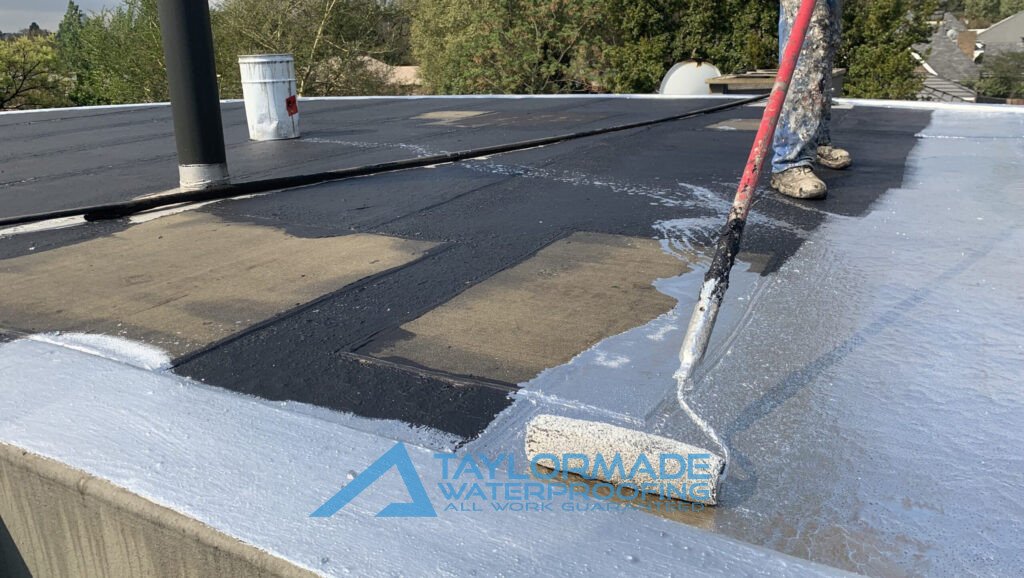
Introduction
The Right Waterproofing Solution
Waterproofing is essential for protecting your property against water damage, mold growth, and structural deterioration. Choosing the right waterproofing compound depends on the area being treated, environmental factors, and the level of protection needed. In this guide, we’ll break down the most common types of waterproofing compounds, their applications, and their benefits.
1. Bitumen-Based Waterproofing Compounds
Overview: Bitumen-based compounds are a durable, asphalt-derived solution and used in various forms, including sheets, liquids, or paint-like applications.
Applications
- Flat Roofs
- Basements
- Foundations
Benefits
- Long-lasting and resistant to weather extremes.
- Provides excellent UV protection.
- Suitable for heavy-duty applications.
Considerations: This method often requires professional installation (eg. torch-on systems) and can emit strong odors during application.
2. Acrylic Waterproofing Compounds
Overview: Acrylic waterproofing compounds are flexible and UV-resistant, often used for exposed surfaces like roofs, decks, and walls. These compounds form a protective, elastic barrier to prevent water penetration.
Applications
- Flat or slightly pitched roofs
- Balconies and terraces
- Exterior walls
Benefits
- Flexible and elastic, can withstand surface movements.
- UV-resistant, for long-term protection in sunny climates.
- Aesthetic finishes to complement your home’s exterior.
Considerations: Not ideal for areas with standing water or heavy wear and requires extensive surface preparation for optimal performance.
3. Cementitious Waterproofing Compounds
Overview: Cementitious compounds are simple-to-apply solutions, often mixed with water or acrylic additives to form a waterproof coating. These are often used for interior projects due to their ease of application.
Applications
- Bathrooms
- Water tanks
- Interior walls
Benefits
- Affordable and widely available.
- Easy to apply with minimal tools.
- Ideal for areas with minimal water pressure.
Considerations: Can be brittle and prone to cracking over time, especially in high-stress areas. Also requires regular maintenance and reapplication.
4. Silicone-Based Waterproofing Compounds
Overview: Silicone-based compounds are commonly used for sealing joints, cracks, and small gaps around windows, doors, and corners. These compounds create a strong, water-resistant bond.
Applications
- Window frames
- Bathroom joints
- Sealing Cracks
Benefits
- Excellent water repellency
- Easy to apply with minimal tools.
- Ideal for smaller, detail-oriented jobs.
Considerations: Not suitable for large surfaces or high-water-pressure area and can degrade over time with exposure to harsh conditions.
making the right choice
How to Choose the Right Waterproofing Compound for You
When deciding on the best waterproofing compound, consider these factors:
- Surface Type: Flat roofs, foundations, and walls may require different solutions.
- Environmental Conditions: If UV exposure is high (as in Johannesburg), UV-resistant acrylic or bitumen compounds might be best.
- Budget: Cementitious and silicone compounds are typically more affordable, but bitumen-based solutions offer long-term durability.
- DIY vs. Professional Application: Some compounds, like cementitious or liquid coatings, can be applied by homeowners, while others, like bitumen-based compounds, require professional installation.
Value for money
A Taylormade Waterproofing Solution
At Taylormade Waterproofing, we understand that every property is unique. Our team specializes in applying a range of waterproofing compounds tailored to your specific needs, ensuring long-lasting protection. Whether it’s a flat roof, balcony, or basement, we’ve got you covered with expert solutions.
Ready to protect your home? Contact us today for a consultation!
Ready to protect your home?
Contact us today for a consultation!
Protect your home with the most durable waterproofing solution available. Whether you need waterproofing for your roof, balcony, or foundation, Taylormade Waterproofing has you covered.
FAQs
How long do waterproofing compounds last?
The lifespan varies depending on the type of compound. Bitumen-based solutions can last up to 20 years, while cementitious compounds may require reapplication every 5–10 years.
Can I apply waterproofing myself?
Some compounds, like cementitious or acrylic coatings, are DIY-friendly. However, for high-durability applications (like bitumen-based systems), professional installation is recommended.
How do I maintain my waterproofing?
Regular inspections and cleaning of the waterproofed surfaces are necessary to ensure longevity. We recommend professional checks every 2-3 years.
How do I book an appointment?
To schedule an appointment, simply click on this link and use our convenient booking system. You can select your preferred date and time, and our team will confirm your appointment promptly.
What areas do you serve?
We serve homes across Johannesburg, including Sandton, Parktown, and Bryanston.
Take Action
Don’t let small signs turn into costly problems. Contact Taylormade Waterproofing today for a free booking consultation. Our experts are ready to safeguard your property with long-lasting waterproofing solutions.

